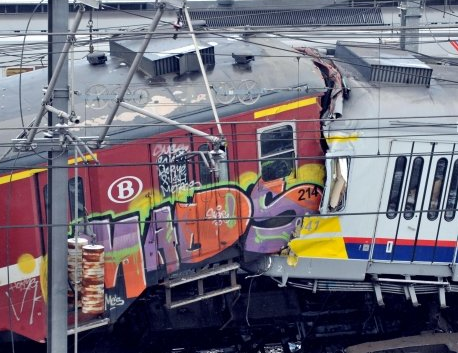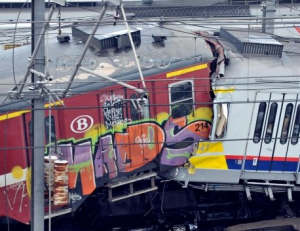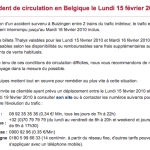One tradgedy doesn’t mean Thalys needs to mess up everyone’s lives

 Tragedy hit the Belgian railways today with the crash of two commuter trains at Buizingen. There’s nothing I can add to what has been written about that already – any loss of life is always devastating, and I just hope this crash was not caused by linguistic issues.
Tragedy hit the Belgian railways today with the crash of two commuter trains at Buizingen. There’s nothing I can add to what has been written about that already – any loss of life is always devastating, and I just hope this crash was not caused by linguistic issues.
But instead I would like to focus on what the railway companies are doing in response to the crash, for the whole of the Brussels-Hal main line (which includes connections to between Brussels and both Paris and London) is blocked at least for the whole of Tuesday 15th February.
Eurostar has been quick off the mark explaining to passengers what they should do. It’s a bit of a mess – taking a train via Gent and Lille Flandres – but it would give you a route to get to London.
 So what about Thalys, operator of about 25 daily services between Brussels and Paris. Absolutely nothing. They announce on their website (see screenshot to the left) that all services are simply suspended. So a good friend of mine in Brussels is going to miss her mother’s birthday in Paris tomorrow as a result, and surely many thousands of other people – who for reasons personal and professional – need to get themselves from Paris to Brussels and vice versa.
So what about Thalys, operator of about 25 daily services between Brussels and Paris. Absolutely nothing. They announce on their website (see screenshot to the left) that all services are simply suspended. So a good friend of mine in Brussels is going to miss her mother’s birthday in Paris tomorrow as a result, and surely many thousands of other people – who for reasons personal and professional – need to get themselves from Paris to Brussels and vice versa.
Because of one tragedy on the Belgian network this is no reason to mess everyone else’s life up!
So, as Thalys isn’t doing anything at all, what could they do? There is a branch off the Hal-Lille High Speed Line not too far from Tournai (on Google Maps here) that’s used for the daily Paris-Mons-Charleroi-Namur Thalys service. Thalys trainsets are able to operate across the entire Belgian network as far as I am aware, and at speeds of up to 160km/h on regular lines. Thalys could very easily direct all its services off the High Speed Line close to Tournai and route the trains on the regular route used by Charleroi-Brussels services, via Nivelles. The journey time on that route would be something around 2 hours, perhaps 2 hours 15 minutes. Thalys could easily operate every other train and have enough trainsets to cover the extra journey time.
Another alternative would be for all Thalys trains to terminate in Hal, as the rail accident was actually at Buizingen, a good few kilometres north of Hal. Hal station has half a dozen platforms – surely enough for a few Thalys trains to terminate? Yet another alternative would be for Thalys trains to terminate at Kortrijk instead, and from there passengers would take a Belgian internal IC train via Gent.
So why do they not get on and do it? Is Thalys just so damned smug in its market position, with its monopoly on Paris-Brussels rail services, that it just does not think it needs to do anything? It’s pretty damned lousy.
[UPDATE]
A regular blog reader who is a Thalys regular traveller has just mailed me the Thalys news e-mail about the service disruption – 48 hours after the Buizingen accident they just state that traffic is fortement pertubé. Great, thanks folks. Very handy, and very timely. Click here to view a screenshot of the Thalys mail.
Hi,
does anybody know whether the accidents counts as “force majeur” and whether travellers are entitled to compensation? I bought the tickets AFTER the accident, but still with the schedule that the trains arrive on time. Needless to say it took me 5hours from Paris to R’dam. I was wondering if I am entitled to compensation by Thalys. The usually brag about their compensation policy.
Any body has a cloud?
Best,
Stefan
Don’t forget the distinction between being qualified as a train driver, and having the route knowledge to drive a train on a given line. You don’t just get in and go. Route knowledge has to be kept current. Where you have a pool of drivers dedicated to a particular service, it will be more complicated to ensure they maintain currency on lines on which their trains don’t normally go. Don’t underestimate the border: for SNCF drivers to maintain route knowledge of Belgian lines other than the HSL and vice versa would be a fun thing to organise!
In your example, since the new line has only been used by Thalys for a matter of weeks, most if not all drivers will still be current on the old line. Of course the example shows that it can be done, but perhaps only with months of advance planning;-)
In effect the cost-benefit analysis is like any insurance calculation. Does certain cost x outweigh possible future cost y, and what is the likelihood of having to bear cost y? The question now, as in your later post, is how to harness new media to enable those affected by the repeated unhelpfulness of service-providers to change the balance on that equation.
“As for the contingency planning that you suggest, the investment in getting and maintaining route knowledge for all possible diversionary routes amongst sufficient drivers, plus the costs of implementing a work-around, almost certainly exceeds the immediate identifiable cost of a few days cancellation.”
Yes, probably so – now! But over the 15 years that Thalys has been operating? Plus the qualification process to become a train driver is long, so it should not be hard to maintain a pool of people with the right skills and knowledge.
Also a few weeks back I was on a Thalys that did a diversion actually – onto the old line via Verviers to Welkenraedt rather that the Liège-Aachen HSL. So they can do it if they want to…
On certification, I can’t see any technical reason why the trains shouldn’t be able to use that line. If indeed, they aren’t, obtaining certification would be, as I said, a paper exercise, and no more.
Theoretically, Infrabel should be refunding/not charging for the slots on the HSL, but who knows how the contract is written…
On the reputation question, on that route there’s so little competition, that thalys probably are able to sit back and say “sure they’ll understand we can’t run” and do nothing to help passengers, confident that most will come back. It goes back to the attitutude of staff and management that you questioned a few weeks ago.
As for the contingency planning that you suggest, the investment in getting and maintaining route knowledge for all possible diversionary routes amongst sufficient drivers, plus the costs of implementing a work-around, almost certainly exceeds the immediate identifiable cost of a few days cancellation.
@James – some interesting thoughts there…
– on certification: if Thalys trains are *not* certified on that route, why the hell not? Surely it’s logical to certify trains on all possible routes that could be used in the case of diversions.
– SNCB and the network – surely SNCB (well, Infrabel) would have to compensate Thalys as a result of Brussels-Hal being closed anyway? So surely opening up Charleroi-Brussels to Thalys would reduce the compensation bill?
– as for work arounds vs. compensation – yes, what you say is logical if you apply it to just this incident. But if the railways gain the reputation for having a ‘we’ll just leave you stuck’ attitude then that starts to enter into people’s minds when they chose whether to take the car or plane instead, and overall the railways lose.
“From Thalys’s point of view you need to be damn certain the work-around is going to deliver otherwise you’re in a worse position” – well surely the answer to that is that they have ready-made contingency plans for the entire route? For every part of the route where there is a parallel regular line Thalys could be certified for it, and the drivers trained for it, so the moment there was a problem a diversion could be instigated.
To use a DB example to highlight – I was on the train back from Berlin in January, and a passenger had been taken ill at Bonn Hbf, closing the line. So all ICEs and REs were diverted via Bonn Beuel. 10 minutes delay, but it worked, and the system was very swiftly put in place. OK, Thalys is more complex that that, but even today – the 3rd day after the accident – they *still* haven’t done anything at all. Idiots.
At first glance, there seems no reason why Thalys services couldn’t be rerouted, although it’s possible that the trains are not certificated for the Charleroi-Brussels line (that would be a paper exercise of course). In any case, they would also need to find drivers who were certified for the diversionary route. But let’s consider why they might prefer to stop everything and leave their passengers in the shit rather than find a work-around. Bear in mind that they also stopped Brussels-Cologne (although some are now running today) and Brussels-Amsterdam services, which do not pass the crash site.
Remember that DB stopped running the Paris-Berlin sleeper through Brussels because SNCB wanted too much money. Could it be the same problem here? The fees demanded of Thalys (even though SNCB is a minority shareholder) to run off the usual route and other extra costs, coupled with the number of tickets to be refunded because passengers don’t want to go the long way round may mean it’s cheaper just to cancel everything and refund everybody. I wouldn’t be surprised if load factors are way down these days. They didn’t have much bother accomodating passengers (other than the obvious peak times) when they thinned out the timetable in the bad weather of the past couple of months. There was also the strike action yesterday, as ever strongest in the regions through which the obvious diversionary route passes.
In the end it comes down to a mixture of economic (and contractual) factors and the lack of can-do attitude. Contingency planning is doubtless lacking, at least for the rapid implementation of a work-around. But ask yourself had you been due to travel yesterday, would you prefer a straight “sorry, no trains today” or a “hang about and we’ll see if we can find a way through eventually”? From Thalys’s point of view you need to be damn certain the work-around is going to deliver otherwise you’re in a worse position.
Can we just delete her stupid irrelevant comments pls..
At this stage I’m glad you wrote about this I was just about to do the same until I found your piece.
Thalys gave me 800 free points on Thursday for the inconvenience of delays over the last few weeks. They need to do a lot more than miles now.
They havent communicated any procedures about what to do when you are a The Card member for example.
Its just a mess, they should sort it pronto. Until then I will continue to bad mouth them on Twitter!
Agree about re-routing – something must be possible.
As for Katrina – your pettiness, and insensitivity, has the effect of giving the Flemish a bad name and turning others against you – which I’lm sure was not your intention.
Not even the mention to Pécrot rail crash avoided these silly comments on linguistics, who cares!? Plus this blog is written in english, not flemish or french, so.. anyway, who cares? 20 people died. Peace.
Just a huge fail of a frustrated flemish.
We have here, ladies & gentlemen, an english speaking person writing about a Belgian tragedy… and all of a sudden, again, the stupidity strikes again.
Katrina, you just diserve the next nomination to the Darwin awards.
…
oh, maybe you’re part of those narrowminded that thinks Brussels is located in the neighborhood of Antwerp (or Antwerpen, or Anvers).
I am sure the people preferred to die in Halle instead of dying in Hal.
Oh, for goodness sake don’t be so damned petty! Yes, it’s Hal in French and Halle in Dutch. But frankly I don’t give a f**k about whether I used the French or Dutch spelling of the city name or not. Other matters – like whether people get to their destinations or not – is more important in this case.
The city is called Halle, not Hal.
Or you should use Namen (Namur), Bergen (Mons), Nijvel (Nivelles) and Doornik (Tournai) to be fair, but that wouldn’t make much sense…